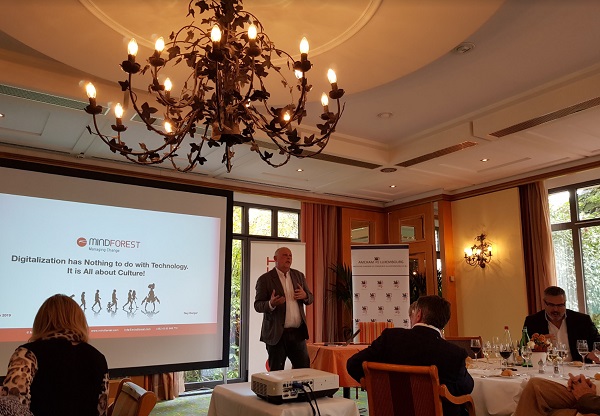 Guest speaker Guy Kerger (MindForest SA);
Credit: Jazmin Campbell
Guest speaker Guy Kerger (MindForest SA);
Credit: Jazmin Campbell
The American Chamber of Commerce in Luxembourg (AMCHAM) and MindForest SA, a consulting company specialised in change management, today held a luncheon on the topic of digitalisation at Hotel Parc Belair.
AMCHAM Chairman Paul Schonenberg kicked off the event by explaining the choice to focus on the topic “Digitalisation has nothing to do with Technology. It’s All About Culture”. Mr. Schonenberg highlighted the importance of discussing this process of digital transformation which is still very much in its infancy in Luxembourg, adding that the Grand Duchy could lead this development “if we do it right [and] in an inclusive way” in which no one gets left behind.
Considering the growing importance of this transformation, Paul Schonenberg announced AMCHAM’s decision to focus on the theme of digitalisation over the next few years, in partnership with local companies like MindForest, who presented their ideas at this afternoon’s luncheon.
On this occasion, guest speaker Guy Kerger, a consultant at MindForest, addressed the issue of change management, focusing on five main points: the accelerated speed of change in relation to technology; changes in the behaviour of society; how organisations face these changes; cultures; takeaways (ie what is working and what is not).
Firstly, Mr. Kerger highlighted that the speed at which new technologies are emerging has greatly accelerated in recent months and years. Similarly, societal behaviour has changed, for instance people are increasingly trustful of technology from social media to autonomous vehicles. On his third point, Guy Kerger discussed some of the ways that organisations have faced and should face these changes, namely by planning ahead and anticipating change even if they cannot predict how this change will actually appear. He added that companies should focus primarily on the basics of focusing on their clients, having organisational flexibility and preparing for incremental change and skills. Finally, they should be aware of new technologies.
Mr. Kerger then dedicated a large part of his presentation to company culture(s). In this context, he contrasted what current cultures often look like (little room for creativity) and what digital and innovative cultures look like (reactive and agile; collaborative; risk taking). He added that companies tend to ignore the informal systems within their cultures, for instance employees’ informal connections (eg relationships), and have no way to control these systems which actually often contribute greatly to productivity.
In this regard, Mr. Kerger quoted Peter Drucker: “Culture eats Strategy for breakfast”, arguing that companies need to take care of their culture and ensure employees are motivated, or they will not succeed. He added that “strategy, capabilities and culture need to be aligned”, with strategy serving as the “guiding path” but culture as the “driving path” to success. Nevertheless, he recalled that “culture is the DNA of an organisation, how people behave” and as such, it takes time to change that culture. Mr. Kerger concluded this section with some advice on how to ensure the success of a digital project: through focussing on changing the mindset of employees and the organisational culture, even before deciding on the digital tool(s) to use.
Guy Kerger closed his presentation with some takeaways, namely that companies should figure out their business strategy before investing (and ensure they are capable of delivering), leverage their insiders and involve them in the process of digital transformation (even if they are against it), recognise employees’ fears of being replaced as a result of digitalisation and support their ability to evolve in the company, and introducing a “Silicon Valley start-up culture”. On the latter point, he emphasised the need for agile decision-making, getting a flat structure and allowing experimentation (ie see how customers react and allow employees to get creative). Mr. Kerger concluded with the following statement: “It may be a digital revolution but it’s cultural development”.
The presentation was followed by a Q&A session with the audience, which included several professionals from companies implementing digital transformation and change management strategies. Questions focussed on communicating change in a big company, changing and surviving company culture(s) and the international dynamics in Luxembourg in the context of digital transformation. In response, Guy Kerger reiterated the need to improve client and employee experience as well as management experience, as managers “should be the first to explain [the process]”. He also responded to a question on advice to a CEO and employee in the same company by highlighting the need for CEOs to talk and listen to their employees and not just “look at what people buy but ask the front desk what people want”. He added that CEOs should support their employees through these changes and set a “higher goal” for the team to reach. Regarding the international dynamics in the Grand Duchy, Mr. Kerger found this to be “a big advantage” as companies in Luxembourg are “used to being confronted with different cultures all the time”. On the other hand, he recognised the potential problem for consultants of having to “combine languages, cultures and expertise”, although Luxembourg tends to be able to handle this.
Paul Schonenberg closed the luncheon by reiterating that this focus on the theme of digitalisation is an “ongoing activity” for AMCHAM. He added that there remains “lots of heavy lifting to be done”, but that together we can complete this process and create a better future for everyone in Luxembourg.








